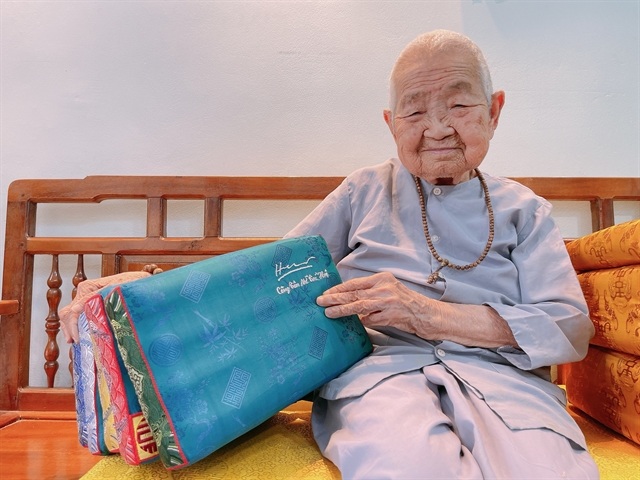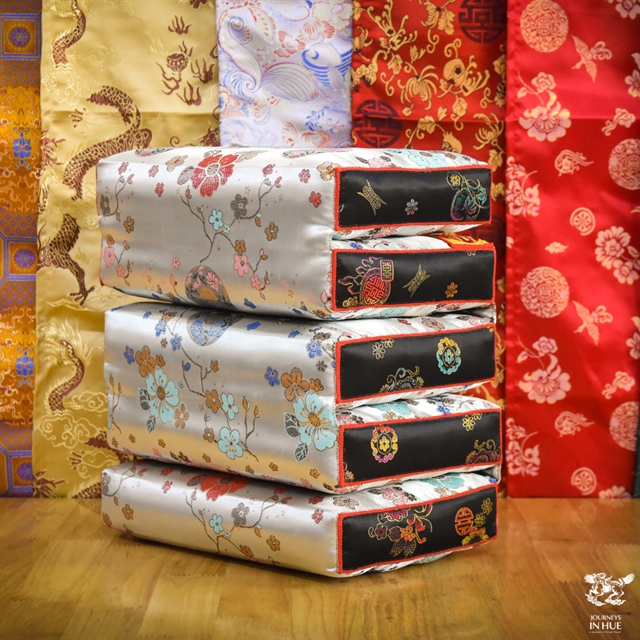by Tường Vân
Công Tôn Nữ Trí Huệ, the last lady to make armrest cushions for the Huế royal family, has passed away at the age of 101.
Born in 1922 and raised in a royal family of the Nguyễn Dynasty (1802-1945), she was one of King Minh Mạng's great-granddaughters. Her family was well-known for practising traditional medicine.
When she was 17, she entered the palace to study sewing and embroidery. As a result, she was able to serve the royal family.

CUSHION MAKER: Công Tôn Nữ Trí Huệ and her pillows representing the Huế royal court. Photos courtesy of Gối tựa Mệ Trí Huệ
Royal upbringing
During her nine years at the palace, she made both arm cushions and garments for Đức Từ Cung - the mother of King Bảo Đại.
She married Nguyễn Văn Lộc at the start of the war of resistance against the French. He owned a pharmacy that was a revolutionary establishment in Huế. They did business while also providing medicine for the resistance force in secret.
Out of respect, people call her "Mệ", the word for “Mother” in Huế, like many other members of the royal family.
She was a rare person in history to retain the techniques of making cushions while also preserving the royal court's unique cultural and historical values.

Trí Huệ's pillows are known to many tourists.
Royal craft
Bùi Thị Ngọc Điểm, Mệ Huệ's daughter, said that her mother had spent half her life attached to the royal pillow. Though the monarchy had gone nearly 80 years ago, the craft it once bred lived on.
Mệ Huệ used to make resting pillows for the kings and queens of the royal family in Huế, now her signature pillows have gone to many places in the country and abroad, serving ordinary people with the comfort once only the royals could enjoy.
Not long before Mệ Huệ passed away, her daughter wrote an open letter, sharing her mother's wish to teach anyone interested in the craft.
During her life, she mended items made of cloth for worshipping in the Purple Citadel and the kings' mausoleums after the last king, Bảo Đại, abdicated in 1945.
At the suggestion of the late King Mother Từ Cung, she made all the arm rest pillows anew because the old ones were getting tattered. Though no more kings would use it, the beautiful pillows were loved by the family.
After 1992, Điểm said her family had to plough the fields to plant rice for a living. But it was hardwork and could not help her feed the family. They once again had to rely on the sewing machine to tailor áo dài (traditional long dress) to make ends meet.
"During this tough time," Điểm wrote in the letter, "No one ever thought about the brocade armrest pillows, my mother grafted the pillows from leftover fabric from making áo dài to quench her craving for making the pillows."
"There were days, when she longed to make a full set of pillows, with silk covers and flowers embroidered on them. But how we could afford it when we were so poor?"
The craft flashed in 2002 when researcher Trịnh Bách ordered a pair of royal armrest pillows, and it gave Mệ Huệ so much joy and happiness, like a "summer shower", according to her daughter Điểm.
Huệ got her first apprentice, who was also her daughter-in-law. Pillows were made, but after the first wave of joy, not many people were interested in making them, nor learning the craft, let alone purchasing them. The whole family went back to making áo dài, again.
In 2018, a company specialising in making traditional clothes invited Mệ Huệ to their shop opening. Since then, more people learned about the craft and orders grew over time, not much, but it provided enough work for the family.

PASSED ON: Her art and craft lives on, cherished and sewn by youngsters in her workshop.
Mệ Huệ had always wished to teach the profession to as many people as possible, even if it meant doing so for free because she was afraid that when she died, no one else would do it.
Mệ Huệ was survived by four members of her immediate family who could do the job, and many young apprentices willing to learn the craft.
Having been laid to her final resting place in Hương Trà Town of Thừa Thiên Huế Province, she could not have been happier. VNS
OVietnam